
GERMANISCH-ROMANISCHE MONATSSCHRIFT
Scope & Guideline
Exploring the Intersections of Language and Literature
Introduction
Aims and Scopes
- Literary Studies and Analysis:
The journal emphasizes in-depth literary analysis, exploring themes, genres, and historical contexts across Germanic and Romance literatures. - Translation Studies:
It examines the complexities of translation, focusing on cultural hybridity, the intricacies of multilingualism, and the impact of translation on literary reception. - Cultural History:
The journal explores the interrelations between literature and cultural history, examining how literary works reflect and influence social, political, and philosophical developments. - Interdisciplinary Approaches:
GERMANISCH-ROMANISCHE MONATSSCHRIFT encourages interdisciplinary research, combining insights from literary studies, philosophy, history, and cultural studies. - Theoretical Contributions:
The publication features theoretical discussions that address contemporary issues in literature, such as identity, memory, and representation. - Focus on Historical Contexts:
The journal pays particular attention to historical contexts, examining how past literary movements and figures have shaped contemporary literary discourse.
Trending and Emerging
- Multilingualism and Cultural Hybridity:
A growing focus on multilingualism and cultural hybridity highlights the complexities of identity and translation in contemporary literature, reflecting our increasingly globalized society. - Environmental and Ecocritical Perspectives:
Emerging themes related to ecocriticism and environmental narratives suggest a trend towards exploring the relationship between literature and ecological consciousness. - Intermediality:
An increasing interest in intermediality indicates a trend towards examining the interplay between different media forms, such as literature, visual arts, and performance. - Postcolonial and Gender Studies:
There is a rising emphasis on postcolonial studies and gender issues, reflecting broader societal conversations about representation, power dynamics, and identity. - Contemporary Literary Theory:
Recent publications show a shift towards contemporary literary theories, including discussions on autofiction, transmedia narratives, and the role of the author in modern literature.
Declining or Waning
- Traditional Canonical Literature:
There has been a decline in papers focusing solely on traditional canonical works, suggesting a move towards more contemporary and diverse literary voices. - Historical Literary Figures:
While historically significant authors have been a staple, recent issues show a waning interest in extensive studies of individual historical figures in favor of broader thematic explorations. - Narrowly Defined Literary Genres:
The exploration of narrowly defined literary genres is decreasing, with a shift towards interdisciplinary and genre-blending analyses. - Static Cultural Narratives:
There is a noticeable reduction in studies that rely on static cultural narratives, as the journal embraces more dynamic and multifaceted cultural analyses.
Similar Journals

Studia Litterarum
Navigating the Rich Tapestry of Literary StudiesStudia Litterarum, published by the esteemed Russian Academy of Sciences at the A.M. Gorky Institute of World Literature, serves as a vital platform for the exploration and analysis of literature and cultural studies. With an ISSN of 2500-4247 and an E-ISSN of 2541-8564, this open access journal has been disseminating valuable research since 2016, reaching a global audience keen on advancing the understanding of literary theory and cultural narratives. Based in Moscow, Russia, the journal has achieved remarkable academic recognition, holding a Q2 classification in Cultural Studies and a prestigious Q1 tier in Literature and Literary Theory, as of 2023. Its Scopus rankings underscore its relevance, with a notable placement in the 51st percentile for literature and literary theory and 27th percentile for cultural studies. Studia Litterarum not only opens doors to scholarly dialogue but also enhances the visibility of contemporary literary scholarship, making it an essential read for researchers, professionals, and students alike seeking to deepen their understanding of the intricate dynamics within literature and cultural studies.

REVUE DES LANGUES ROMANES
Innovating Scholarly Dialogue in the HumanitiesREVUE DES LANGUES ROMANES is an esteemed academic journal published in France, dedicated to the study of Romance languages, linguistics, and literary theory. With an ISSN of 0223-3711, this journal has transitioned to an Open Access model since 2022, broadening accessibility and encouraging collaborative research across disciplines. It serves as a platform for researchers, professionals, and students to explore the intricacies of language and literature within the broader context of arts and humanities. Notably, REVUE DES LANGUES ROMANES has achieved Q4 quartile rankings in 2023 for its contributions to Archaeology, Linguistics, and Literature, reflecting its commitment to fostering scholarly dialogue, despite its emerging status in the academic landscape. With a focus on interdisciplinary approaches, the journal invites innovative insights and critical analyses that further understanding in these fields, promoting the depth and richness of Romance languages and their cultural implications.

Estudios Romanicos
Fostering Global Collaboration in Romanic StudiesEstudios Romanicos, published by the Universidad de Murcia, is an esteemed open-access journal that has significantly contributed to the fields of Linguistics, Language, Literature, and Literary Theory since its inception in 1978. With an impact factor that elevates it to Q3 in Linguistics and Language and Q2 in Literature and Literary Theory as of 2023, this journal ranks impressively within its categories—placing it in the 76th percentile for Literature and Literary Theory, making it an essential resource for academic discourse. Based in Murcia, Spain, the journal embraces an open-access model, ensuring that its rich content is accessible to a global audience—fostering collaboration and cross-disciplinary research. The convergence of knowledge from diverse linguistic and literary perspectives allows researchers, professionals, and students alike to engage with cutting-edge scholarship and extend the boundaries of their own studies.
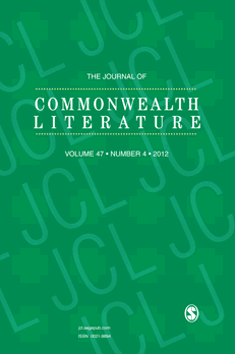
JOURNAL OF COMMONWEALTH LITERATURE
Navigating the Evolution of Literature and TheoryJOURNAL OF COMMONWEALTH LITERATURE, published by SAGE Publications Ltd, serves as a premier platform for scholarly discourse in the field of Literature and Literary Theory. Established in 1966, this esteemed journal has built a robust reputation, as evidenced by its impressive Q1 ranking in the 2023 category of Literature and Literary Theory and its placement in the impressive 91st percentile among its peers in the Scopus rankings. With an ISSN of 0021-9894 and an E-ISSN of 1741-6442, the journal provides valuable insights into the rich tapestry of Commonwealth literature, exploring diverse works and critical theories that shape our understanding of literature outside the conventional Western canon. While currently not designated as an Open Access journal, it continues to attract a global readership seeking to advance knowledge in this vital area of scholarship. Researchers, professionals, and students alike will find in its pages a rich resource for innovative ideas and critical discussions that reflect the evolving landscape of literary studies.
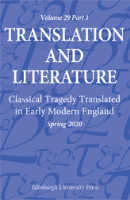
Translation and Literature
Elevating the Discourse on Translation's Literary ImpactTranslation and Literature is a leading academic journal published by Edinburgh University Press, focusing on the intricate relationship between language and literature within the realms of translation studies. With an ISSN of 0968-1361 and an E-ISSN of 1750-0214, this journal provides a crucial platform for scholars and practitioners to explore and disseminate research that addresses both the theoretical and practical aspects of translation. Since its inception in 1996, Translation and Literature has established itself as an essential resource, particularly noted for its contributions to the fields of linguistics and literary theory, as indicated by its Q4 ranking in both categories in 2023. The journal's articles are designed to foster dialogue across disciplines, encouraging innovative thinking and collaboration among researchers, professionals, and students alike. Access to this valuable resource is currently available through subscription, ensuring high-quality scholarship reaches a diverse audience dedicated to advancing the understanding of translation's role in literature.
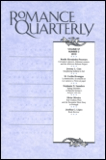
ROMANCE QUARTERLY
Exploring the Heart of Cultural NarrativesROMANCE QUARTERLY is an esteemed journal published by Routledge Journals, Taylor & Francis Ltd, focusing on critical discussions and innovative research in the fields of Cultural Studies and Literature and Literary Theory. With its inception in 1986, this journal has diligently documented the evolving landscape of romance literature, making significant contributions through interdisciplinary approaches that resonate across literature and cultural scholarship. Holding a commendable position in academic rankings, it is classified in the second quartile for Literature and Literary Theory, and in the third quartile for Cultural Studies as of 2023, highlighting its relevance and impact within these domains. While it operates under a traditional access model, the required scholarly discourse and access to contemporary studies make it a crucial resource for researchers, educators, and students alike. ROMANCE QUARTERLY serves not merely as a platform for publishing but as a vibrant hub for the exploration and analysis of romance narratives, offering invaluable insights into their impact on cultural and societal constructs, surely a must-read for anyone passionate about these subjects.

Acta Universitatis Lodziensis Folia Litteraria Romanica
Exploring the Depths of Language and Literary TheoryActa Universitatis Lodziensis Folia Litteraria Romanica is a distinguished open-access journal published by LODZ UNIV PRESS since 2016, dedicated to advancing scholarship in the realms of Linguistics and Literature and Literary Theory. With a strong commitment to disseminating high-quality research, the journal serves as a vital platform for scholars and practitioners aiming to explore the complexities of language and literary studies. It is positioned within Q4 in Linguistics and Language and Q3 in Literature and Literary Theory, evidencing its growing influence in these fields. The journal's inclusion in the Scopus rankings, with notable placements in both the Arts and Humanities and Social Sciences categories, underscores its relevance and engagement with contemporary discourse. Located in Poland, the journal encourages contributions from a diverse range of voices and perspectives, promoting scholarly dialogue and innovation, while adhering to an open-access format for enhanced accessibility. Researchers, professionals, and students will find Acta Universitatis Lodziensis Folia Litteraria Romanica an invaluable resource for their academic pursuits.
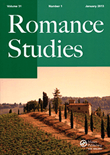
Romance Studies
Celebrating the Intersections of Language and LiteratureRomance Studies is a distinguished academic journal focused on the interdisciplinary exploration of Romance languages, literatures, and cultures. Published by Routledge Journals, Taylor & Francis Ltd in the United Kingdom, this journal offers a vital platform for scholars to disseminate cutting-edge research and critical analyses within the fields of literature and literary theory. With an H-index reflecting its academic influence and a 2023 Scopus ranking placing it in the 47th percentile, Romance Studies serves as an essential resource for researchers, professionals, and students passionate about Romance studies. The journal features a robust selection of articles that span a range of topics, encouraging dialogue and scholarly engagement among readers. Although it does not currently operate under an open access model, its rigorous peer-reviewed articles are instrumental for anyone seeking to enhance their understanding of Romance languages and literature from 1983 to the present.

Anales de Literatura Espanola
Connecting Scholars to the Heart of Spanish Literary TheoryAnales de Literatura Espanola is a premier academic journal established by UNIV ALICANTE, dedicated to the exploration of Spanish literature and its multifaceted theories. Marked by its Open Access policy since 1982, the journal promotes the dissemination of knowledge to a global audience, enhancing accessibility for researchers, educators, and students alike. With a robust impact factor reflecting its academic rigor, it has achieved a commendable rank of Q2 in the field of Literature and Literary Theory for 2023, placing it among the upper echelon of literary journals. The journal has undergone significant evolution over its converged years from 2019 to 2024, adapting to contemporary discourses and facilitating interdisciplinary dialogues. Additionally, its position in the Scopus rankings underscores its relevance, holding a rank of #686 out of 1106 in the Arts and Humanities sector. Published out of Alicante, Spain, it welcomes submissions that contribute to the understanding of literary practices and cultural narratives, making it an essential resource for scholars and literary enthusiasts keen on expanding their knowledge within this vibrant field.
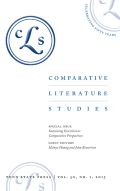
COMPARATIVE LITERATURE STUDIES
Advancing Global Literary ConversationsComparative Literature Studies is a distinguished journal published by Penn State University Press, focusing on the diverse and evolving field of comparative literature. With an ISSN of 0010-4132 and an E-ISSN of 1528-4212, this quarterly journal has been a critical platform for scholarly dialogue and interdisciplinary research since its inception in 2000. The journal proudly ranks in the Q3 category for Cultural Studies and Q2 for Literature and Literary Theory (2023), showcasing its significant impact within these domains. Notably, it ranks #214/1106 in Literature and Literary Theory according to Scopus, placing it in the 80th percentile—highlighting its relevance and quality in the global academic landscape. Despite its traditional subscription model, the journal remains a crucial resource for researchers, professionals, and students keen on exploring the intersections of cultures, texts, and histories. By publishing cutting-edge research and critical essays, Comparative Literature Studies aims to expand the horizons of literary analysis and foster innovative scholarly exchanges.